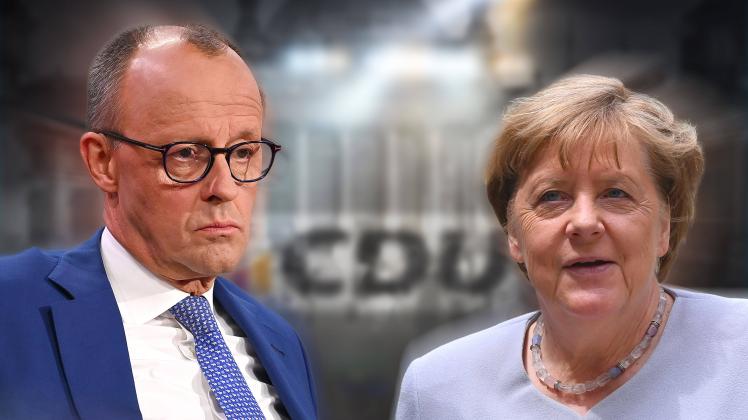Conservative Friedrich Merz, favorite to win the German elections
- The government coalition of the “semaphore” led by Social Democratic Prime Minister Olaf Scholz with the greens and liberals broke down at the end of the year. On Sunday there will be a general election to elect the new German chancellor, whose favorite, according to polls, is the conservative candidate Friedrich Merz. For years, Merz has been the main enemy of former Chancellor Angela Merkel within the CDU-CSU.

The government coalition of the “Semaphore” led by Olaf Scholz after the expulsion of Christian Lindner, Minister of Finance and leader of the liberal government, broke down at the end of last year. After losing his vote of confidence in the German Parliament on December 16, declaring that "now the Germans will decide what direction the country should take", Scholz paved the way for a general election. The elections will take place on Sunday, and polls show that the conservative Friedrich Merz of the CDU/CSU is the most likely to reach the Foreign Ministry. The hostility that the conservative candidate maintains with former Chancellor Angela Merkel, which has come to light again on the eve of the campaign, is well known.
Who is Friedrich Merz?
Born in the western German city of Brilon, his political career began in 1989 as a CDU-CSU MEP. From 1994 he served as a federal deputy in the German Parliament and a few years later he became the head of the parliamentary group. Merz’s political career began when Angela Merkel took over the party leadership in 2000. His theses on immigration and economics immediately clashed with the Christian Democrat line that Merkel wanted to establish in the party.
After Merkel excluded herself from the leadership of the parliamentary group and distanced herself from the party’s power centres, Merz decided to abandon politics in 2009. Since then he has worked for many years for the international investment fund Black Rock. Some of the foundations and keys to his ideology are found in his 2008 book Mehr Capitalism-Wagen (More Wagons of Capitalism), in which he vigorously defends globalization and, above all, transatlantic economic agreements.
After seeing Merkel’s farewell approaching, he decided to return to politics. In 2018 and 2021, after losing the primaries against Annegret Kramp-Karrenbauer and Armin Laschet, who supported Merkel’s line, the party’s leadership was acquired at the congress in December 2021, virtually in the midst of the pandemic. If he wins the elections on Sunday, it can be assumed that he will not repeat certain immigration or economic policies supported by Angela Merkel.

The umpteenth clash with Merkel on the eve of the elections
A motion proposed by Merz in the German Parliament on immigration on the eve of the elections has thrown dust on the country and on the CDU/CSU party he represents. The motion speaks of the need to tighten controls and the possibility of excluding undocumented aliens without exception. The conflict erupted after the far-right AFD voted alongside the conservative supporters of the motion, including Angela Merkel against the conservative candidate in the opinion column published on her blog.
Merkel reminded Merz that in the recent fall of the “Semaphore” government, she had declared that she would agree to the Bundestag proposals in the Greens and Social Democrats pending the formation of the new government. After the motion, which was voted on January 29, was backed by liberals and ultra-rightists, the former chancellor denounced in his column that Merz has not fulfilled what he promised. As if that were not enough, the vote on the motion served for the first time to break the sanitary cordon imposed by Angela Merkel, along with the other German parties, on the ultra-right.
Contrara AFD’s ultra-rightists have made a very different assessment. The AFD has described as historic what happened on January 29, the motion having been voted on for the first time together with conservatives and liberals. The revelation of the Spanish State Diario.es brings to its pages the words of Bernd Baumann of the AFD, who also addressed Merz after the vote: “It’s really a historic moment...Mr. Merz, you helped make it happen, and now you’re here, your knees shaking, and you’re apologizing.”
On the eve of the election, the motion becomes an unintentional goal for Merz at his door. On 2 February, under the slogan “The Uprising of the Righteous for the Sanitary Cordon”, almost 200,000 people took to the streets to demand that the parties in Berlin and especially the CDU/CSU move away from the far right.
CDU-CSU Congress to Calm the Climate
The day after the mobilizations, the CDU/CSU held its congress in Berlin with 20 days left for the general elections, under the slogan “Forward again”. During the congress in the middle of the protests to denounce the approval of the motion, Merz sharply addressed the affiliates, saying that from now on there will be no collaboration with the AFD and adding that this party has opposed the policies supported by the CDU/CSU in recent years. He stressed that the ultra-right are the enemies of the euro and NATO.
There were words to put an end to the turmoil and to plunge deeply into the race of the elections. Although it received support from its members, it remains to be seen whether it will have an impact on the German electorate.

What do the latest surveys say?
If we look at the measurements of the YouGov and Europe Elects survey houses published in the German media, the CDU-CSU, led by Merz, would win the elections with about 30% of the votes. Conservatives would prevail in most parts of the western part of the country. The far-right AFD would be in second place with 21%. It would be the first force in the East. The AFD achieved spectacular results in last year’s elections in several eastern regions, being the first force in the Thuringian Lander and barely winning in Brandenburg and Saxon. The tycoon Elon Musk has publicly supported the candidacy of the far-right.
The social democratic party of former Prime Minister Olaf Scholz would be the third force to win about 16% of the votes and almost equals the green party. It is clear that the situation without absolute majority will come from Monday. In view of the coalitions that could be formed, there could be great opportunities to repeat the “Great Coalition” of conservatives and social democrats of Merkel’s time. According to the polls, the sum of conservatives and social democrats would reach the 316 seats needed to form the majority, but this could be conditioned by the results of the far right.
The rest of the party seems to be running around the 5% of the votes needed to enter the Bundestag. After the boom in recent weeks, the left-wing Die Linke will surely be in parliament. It is not so clear whether the populist left-wing BSW movement led by Sahra Wagenknecht and the FDP liberals will get into parliament.
Berlinen martxoaren 8an izandako manifestazioa gogorki erreprimitu du Poliziak. Palestinaren aldeko aldarriak zeramatzaten manifestariek. Agintariek Alemanian arabierazko abestiak eta diskurtsoak debekatu dituzte manifestazioetan, "segurtasun publikoko" arrazoiak direla... [+]
Alemaniako Poliziak asteleheneko gertakariaren arrazoiak "politikoak" zirela baztertu duen arren, 35 urteko Alexander Scheuermann Ring Bund talde neonaziko kide zen. Bi hildako eta hamar zauritu utzi dituen atentatuaren egileak sare sozialetan "gorroto mezuak"... [+]
Ikerketa bat egin dute Alemanian, hauteskundeen atarian: kontuak sortu dituzte TikToken, X-n eta Instagramen, eta aztertu egin dute algoritmoak zer nolako edukiak erakusten dituen. Guztietan, algoritmoak eskuinera eta eskuin muturrera jotzen du gehien, TikToken nabarmen.
Sozialdemokratek inoizko emaitzarik kaskarrenak lortu dituzten arren, litekeena da demokristau kontserbadoreekin elkartzea eta gobernua osatzea. Botoen %28,5 jaso ditu CDUk, eskuin muturreko AfDk %20,7 eta SPDk %16,4.
Porzheim, Germany, February 23, 1945. About eight o’clock in the evening, Allied planes began bombing the city with incendiary bombs. The attack caused a terrible massacre in a short time. But what happened in Pforzheim was overshadowed by the Allied bombing of Dresden a few... [+]




















